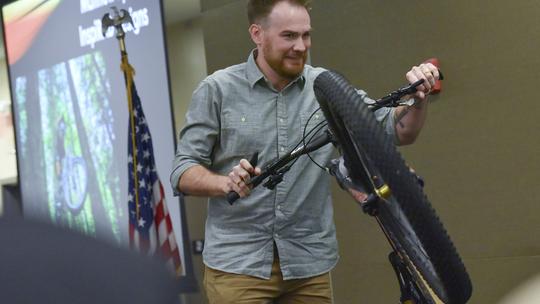
It’s not every day that a startup pitch ends with a bike trick. But for Matthew Byron, CEO of InspiRAD Designs, a bike trick was the perfect way to end his presentation at the 2020 innovateUNG Pitch Challenge in February.
Byron is a mechanical designer and junior pursing an interdisciplinary studies degree at the University of North Georgia. He recently created a customizable pneumatic piston designed to fit a rider’s specifications, offering versatility he says can’t be achieved in existing pneumatic pistons. Where pistons are typically designed for specific weight ranges, Byron thinks his 3D-printed product is better suited for heavier and lighter riders. Following his presentation and impromptu bike jump off stage, Byron was awarded the $2,000 first-place prize and $500 crowd favorite award.
As an avid biker and a machinist by trade, Byron has long sought to combine these two interests.
“I spend as much time [on my bike] as I can,” he said. He wanted to connect his passion for the sport with professional involvement in the industry.
Byron currently works for a medical device company in north Atlanta, where he’s tasked with creating “innovative solutions to integrate complex machinery for manufacturing,” he said. So, when a friend approached Byron about designing a custom piston for his bike, it took Byron about 15 minutes to mock up a design and send it to the printer.
“For the last three years or so I’ve been using 3D printers widespread, on numerous different projects,” he said. “I’m actually manufacturing in-use parts, which is kind of key because you see a lot of 3D printers used in prototyping and then they’ll use conventional manufacturing for production.” For Byron’s customized piston, the finished product comes fresh out of the 3D printer.
Most of today’s mountain bikes use pneumatic springs for suspension, Byron explained. “In a nutshell, spring systems consist of two chambers — a positive and a negative chamber.” Negative chambers are fixed from the factory, while positive chambers can be adjusted with increased or reduced volume. That’s pretty much the limit for adjustment, he said.
“Essentially what I did is create a special piston using additive manufacturing that allows you to take volume from the positive chamber and transfer that volume to the negative chamber,” he said. Byron said competitors like Vorsprung offer more of a one-size-fits all solution, while he can create a completely personalized piston using values like the rider’s weight and the length of the bike’s suspension. “It was just an innovative approach to creating pistons that can be fine-tuned.”
You aren’t alone if you think this all sounds highly technical. Byron recognizes that fact and admits that the most difficult part of pitching his product has been learning how to communicate the value of the product.
“Getting up on stage and speaking to a bunch of folks about this idea was kind of the biggest challenge,” he said. “It’s a highly technical product for a very specific market.”
Byron, who also works in a bike shop, said he has about 20 people currently interested in buying his pistons. He’s now searching for a 3D printer to help deliver. His goal is to sell the pistons for under $100 installed. While that might sound like a lot for a such small device, Byron pointed out that many mountain bikes can cost over $3,000
“At this price point it kind of is attainable to nearly every mountain biker,” he said. “It’s geared towards racers and weekend warriors alike. The whole spectrum [of riders] can benefit from this product.”








